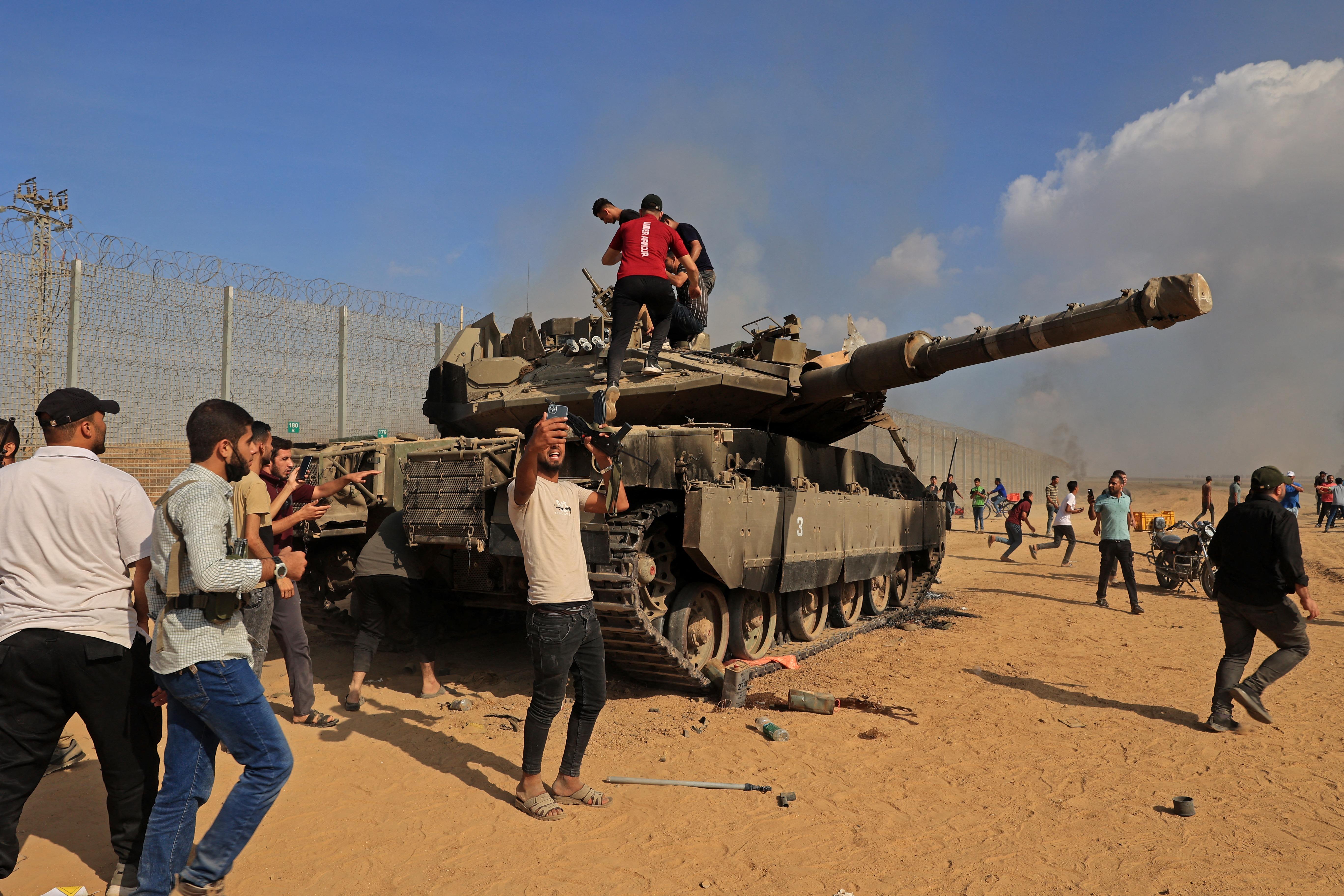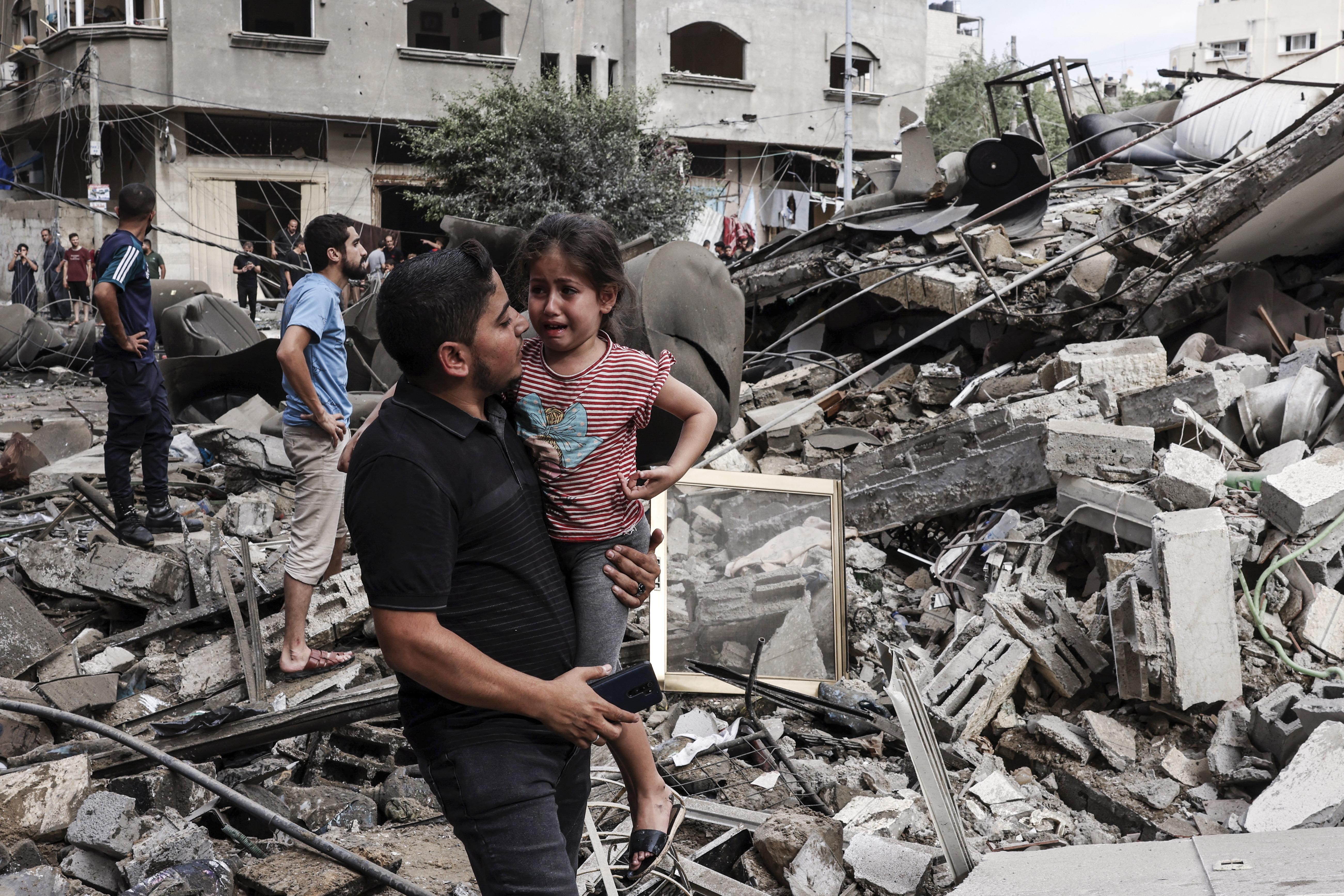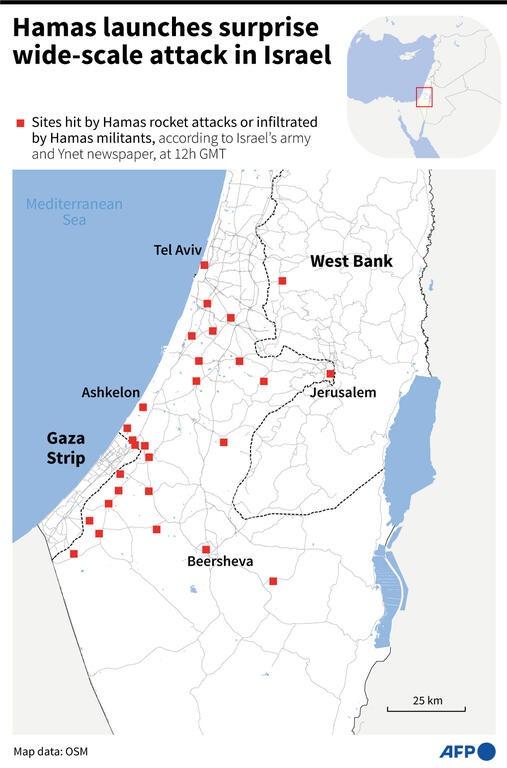 A Palestinian man stands early on October 8, 2023 in front of the rubble of Gaza City's Al-Watan Tower, which was destroyed in an Israeli airstrike. (PHOTO / AFP)
A Palestinian man stands early on October 8, 2023 in front of the rubble of Gaza City's Al-Watan Tower, which was destroyed in an Israeli airstrike. (PHOTO / AFP)
GAZA / JERUSALEM / BEIRUT - The Palestinian Islamic Resistance Movement (Hamas) on Saturday showered Israel with thousands of rockets in a rare surprise attack that was responded with massive Israeli airstrikes on Gaza and punitive measures, including power outages.
According to statistics issued by the Gaza-based Health Ministry, at least 313 Palestinians were killed and 1,990 wounded by the Israeli strikes in Gaza.
At least 300 Israelis were killed and more than 1,800 injured during the Hamas attack that also featured infiltrating ground assaults onto southern Israel, figures released by the Israeli Health Ministry showed
At least 300 Israelis were killed and more than 1,800 injured during the Hamas attack that also featured infiltrating ground assaults onto southern Israel, figures released by the Israeli Health Ministry showed.
Early on Sunday morning, dozens of rockets and heavy artillery shells were fired toward Israeli positions on the Shebaa Farms, a disputed strip of land at the intersection of the Lebanese-Syrian border and the Israeli-annexed Golan Heights.
ALSO READ: Barrage of rockets fired from Gaza into Israel, 1 killed
Lebanese armed group Hezbollah claimed responsibility for the mortar and rocket attack and said it is in solidarity with the Palestinians.
The Israeli military responded with artillery fire and a drone attack was launched later, targeting tents set up by Hezbollah in the region, an army spokesperson said.
Palestinian President Mahmoud Abbas held an emergency meeting attended by senior officials, who emphasized the right of the Palestinian people to defend themselves against Israeli forces and settlers.
 Palestinians take control of an Israeli tank after crossing the border fence with Israel from Khan Yunis in the southern Gaza Strip on Oct 7, 2023. (PHOTO / AFP)
Palestinians take control of an Israeli tank after crossing the border fence with Israel from Khan Yunis in the southern Gaza Strip on Oct 7, 2023. (PHOTO / AFP)
Israeli Prime Minister Benjamin Netanyahu announced in a national address that Israel was "in a state of war" and ordered a full mobilization of reservists.
Deadly conflict
Backed by the rockets, dozens of Hamas militants entered Israeli towns on Saturday near the Gaza Strip, killing and kidnapping Israelis in a surprise morning attack. The Hamas rockets hit as far as Jerusalem, where air-raid sirens sounded.
A spokesman from the Israel Defense Forces, Daniel Hagari, confirmed that some Israeli civilians and soldiers had been taken as hostages by Hamas.
Hamas military commander Mohammad Deif said the attack was in response to Israel's blockade of Gaza, its frequent raids on the West Bank over the past year, its storming of the Al-Aqsa Mosque compound -- a site holy to both Muslims and Jews -- Israeli settler attacks on Palestinians and the expansion of Israeli settlements. He called on other Palestinians to join the fight.
The Palestinian Islamic Jihad movement, another armed Palestinian group, declared that its militants had joined Hamas in the attack.
ALSO READ: Israeli jets target Hamas in Gaza, Lebanon after rocket attack
Videos and photos released on social media showed masked Palestinian militants roaming in jeeps on the streets of the southern Israeli city of Sderot, where an exchange of fire occurred.
A spokesman from the Israeli army said on Saturday that several Palestinian militants entered towns in southern Israel and clashed with the Israeli soldiers.
Israeli media reported that Palestinian militants had controlled at least three Jewish settlements near the Gaza Strip. Israeli authorities asked residents in southern Israel not to leave their homes.
 An Israeli soldiers take cover behind a car as he looks toward bodies on a main road near the Gevim Kibbutz, close to the border with Gaza on Oct 7, 2023. (PHOTO / AFP)
An Israeli soldiers take cover behind a car as he looks toward bodies on a main road near the Gevim Kibbutz, close to the border with Gaza on Oct 7, 2023. (PHOTO / AFP)
In response to the attack, the Israeli military carried out dozens of airstrikes against Hamas targets in the Gaza Strip, destroying buildings, including a residential tower with about 100 apartments. As the main electricity supplier to the Palestinian enclave, Israel also cut off the power to the territory, plunging it into darkness after nightfall.
Residents in Gaza City rushed to the streets to buy daily necessities. In the northeastern part of the Gaza Strip, hundreds of civilians fled their homes with blankets and food out of fear of a military escalation.
Unlikely to end soon
The attack marks the most severe conflict between Hamas and Israel since May 2021, during which the two sides fought for 11 days, resulting in the deaths of at least 256 people in Gaza and 13 in Israel.
Analysts believe the current clash is unlikely to end anytime soon as Hamas appears to be well-prepared to wage a protracted conflict.
READ MORE: An Israeli missile worsens the adversity of 5 disabled siblings
Hours after the massive Hamas offensive, Netanyahu gave a televised address on Saturday night, vowing to "take revenge for this black day." He said the Israel Defense Forces would "immediately use all of its power to destroy Hamas' capabilities," warning of "challenging days still ahead of us."
Egypt, a long-time broker of peace between Israel and Palestinian militant groups, discussed with France on Saturday solving the ongoing conflict.
 A man carries a crying child as he walks in front of a building destroyed in an Israeli air strike in Gaza City on October 7, 2023. (PHOTO / AFP)
A man carries a crying child as he walks in front of a building destroyed in an Israeli air strike in Gaza City on October 7, 2023. (PHOTO / AFP)
In a phone conversation with his French counterpart Emmanuel Macron, Egyptian President Abdel-Fattah al-Sisi warned that further violence and escalation might drag the region into "a vicious circle of tension" and undermine regional stability and security.
Negative impact on Israeli-Arab reconciliation
The attack came on Simchat Torah, a Jewish holiday that marks the conclusion of the annual cycle of public Torah readings, and almost coincided with the 50th anniversary of the Yom Kippur War, which began on Oct 6, 1973, between Israel and a coalition of Arab states led by Egypt and Syria.
The latest round of conflict followed frequent Israeli raids on the West Bank over the past year, often resulting in Palestinian casualties. Israel said these actions were necessary to apprehend Palestinian militants involved in attacks against Israelis.
The military conflict also comes when Israel seeks to normalize its relations with Saudi Arabia. Brokered by the United States, Israel has been in touch with Saudi Arabia over a potential peace deal between the two countries. After meeting with US President Joe Biden on Sept 20 in New York, Netanyahu said the normalization of ties between his country and Saudi Arabia could be "within reach."

For Israel, normalizing relations with Arab countries has remained an important strategic goal for years as it seeks to improve the geopolitical environment. So far, six Arab countries have normalized relations with Israel, including Egypt and Jordan, which established diplomatic ties with Israel in the 1970s and 1990s, respectively, as well as the United Arab Emirates, Bahrain, Sudan and Morocco, which agreed to normalize ties with Israel under the Abraham Accords in 2020.
Hamas has repeatedly said that it condemned any progress in normalizing relations between Arab countries and Israel, saying that normalizing relations between Arab countries and Israel in all forms is unacceptable and is bound to harm the Palestinian cause.
Ding Long, a professor from the Middle East Studies Institute of Shanghai International Studies University, said the protracted Palestinian-Israeli conflict will negatively impact the normalization of Israel and Saudi Arabia relations, adding that Saudi Arabia may suspend normalizing relations with Israel in the short term.


